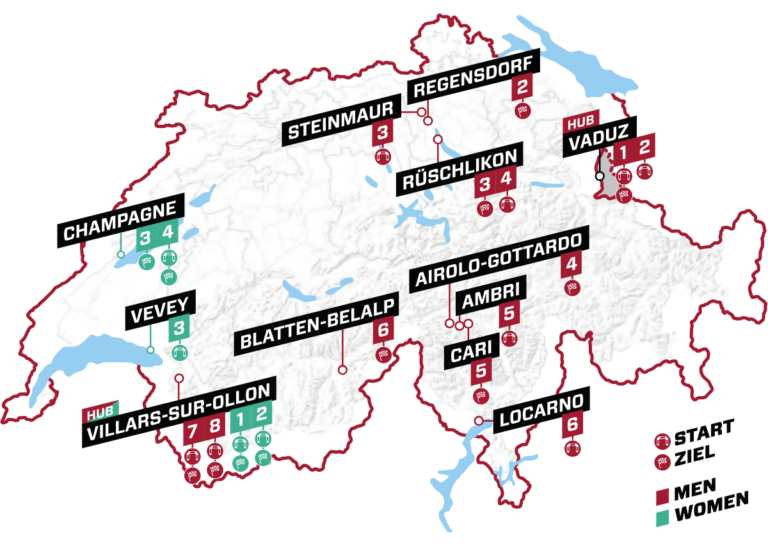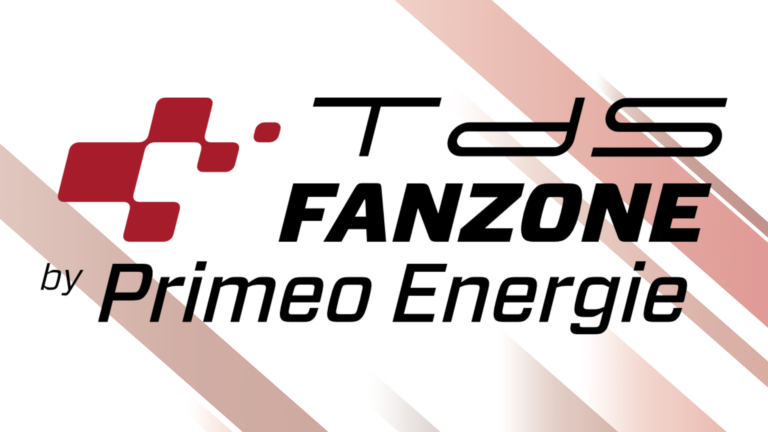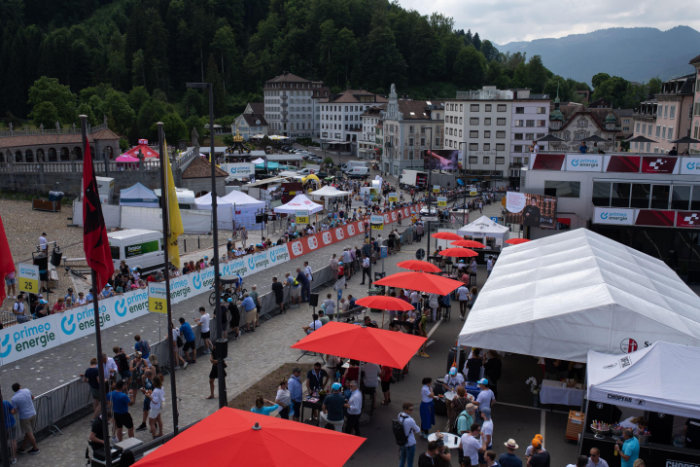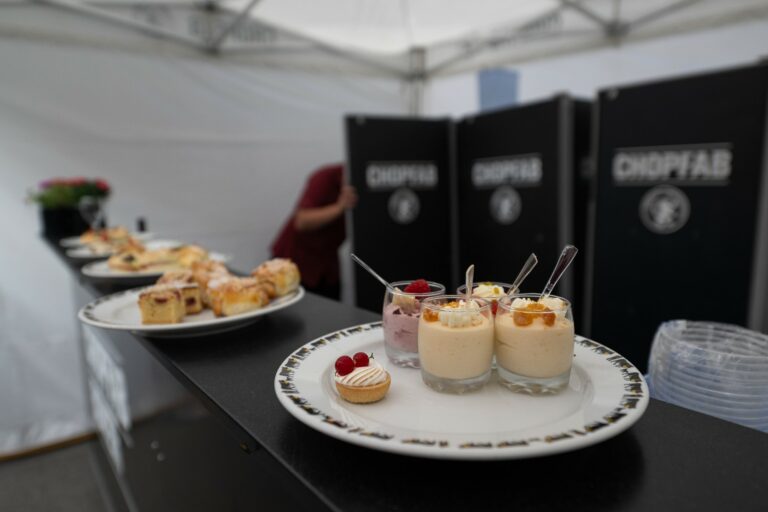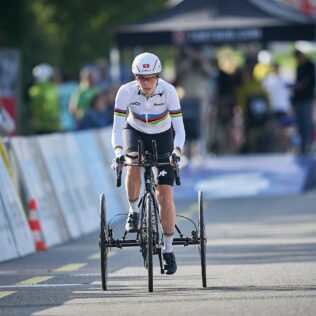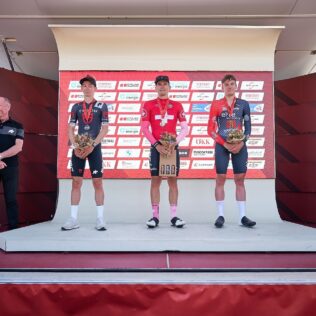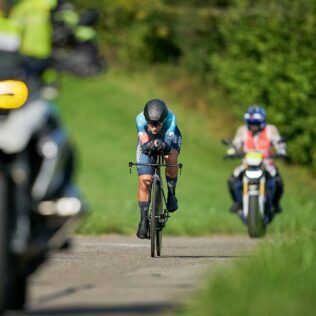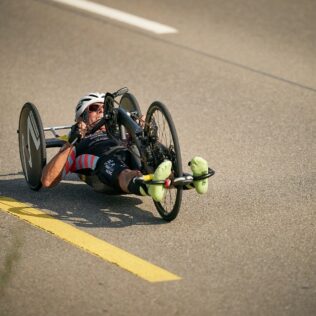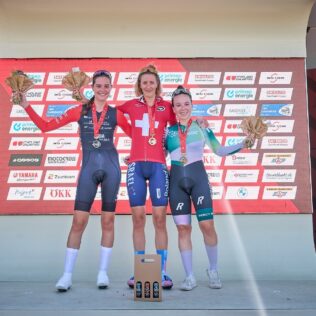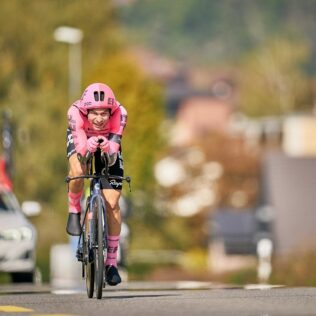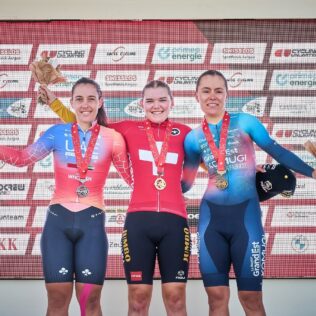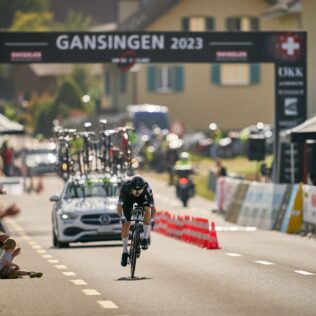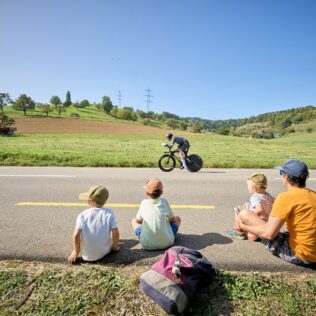The route of the 87th Tour de Suisse will definitely put all riders to the test. Climbers are in for a treat with four mountain finishes and a mountain time trial. The route of the women’s race is equally challenging with plenty of altitude to conquer in the hilly Romandie region.
This year, the riders must complete 950 kilometres and almost 19,000 metres in altitude. While most of the elevation meters are concentrated in the second half of the week, the time trialists, sprinters and classics specialists will be on show in the first half of the race. Tour Director Olivier Senn says of this year’s route: “Only the best climbers will have a shot at overall victory. Stage wins on the other hand will be up for grabs for different types of riders”.
From Vaduz to Villars-sur-Ollon
After the very short time trial prologue of just under five kilometres on Sunday 9th June, the peloton leaves Vaduz the next day and returns to Switzerland with the stage towards Regensdorf. The Zurich region is also the focus of the action on Tuesday 11th June, starting in Steinmaur and finishing in Rüschlikon. After these two potential sprint finish stages, the fast men in the peloton will have to grit their teeth. Four mountain finishes follow in succession. Stage 4 finishes on the legendary Gotthard Pass, which is approached from the north side through the Schöllenen Gorge and via Andermatt. The fifth stage is a pure Ticino stage taking the peloton up to the mountain village of Carì not once but twice. On Friday 14th June, the Nufenen Pass awaits and with it the roof of this year’s Tour de Suisse. “The sixth stage from Locarno to Blatten-Belalp can be described as the Queen stage,” says David Loosli. With a good 150 kilometres to cover there is a total of over 3,500 metres in altitude and a final ascent to Blatten on the agenda.
Villars-sur-Ollon hosts the closing weekend. A mountainous circuit leads over the Col de la Croix on Saturday. This lap with the tough final climb to Villars-sur-Ollon will be tackled twice and marks the fourth mountain finish in a row. “However, the Tour de Suisse 2024 will probably only be decided in the mountain time trial from Aigle to Villars-sur-Ollon,” says David Loosli. Almost 900 metres ascent in just 15 kilometres is a tough final ask.
Tour de Suisse Women entirely in French-speaking Switzerland
The 4th edition of the Tour de Suisse Women covers 330 kilometres and just over 6,600 metres in altitude. The final two stages of the men’s race form the start for the women. The circuit around Villars-sur-Ollon is contested once but it is a tough one of around 60 kilometres with over 1,500 meters in altitude. The next day will see the mountain time trial from Aigle to Villars-sur-Ollon, which is identical to the men’s stage. “This year, the Tour de Suisse Women will be tougher than ever before,” says Olivier Senn confidently. “The fight for the general classification is on from the very first kilometre and the cyclists will need to dig deep,” continues Senn.
On Monday 17th June, Stage 3 starts in Vevey on Lake Geneva and ends in Champagne on Lake Neuchâtel. What sounds like a scenic ride however is actually tough work with almost 2,000 metres of climbing ending in a challenging final lap around Champagne. This last stage of the women’s race could be one for the sprinters, as most of the climbing takes place in the first half of the route. Time will tell whether there will be any late attacks on the GC during the 128-kilometre lap, which starts and finishes in Champagne. “The entire route of the Tour de Suisse Women promises animated competition and the potential for various stage winners,” says David Loosli.
12 UCI Women’s WorldTeams will line up at the 4th Tour de Suisse Women on June 15th in Villars-sur-Ollon. Joining them are seven UCI Women’s Continental Teams representing the second-highest level and, as with the men, the Swiss Cycling National Team.
Growing number of Women’s WorldTeams at the start
From 10 teams last year there are two more UCI Women’s WorldTeams at the start this year. “Thanks to sound organisation and appealing routes, we have been able to solidify our presence in the women’s racing calendar,” says Tour Director Olivier Senn. “With 12 of the 15 world’s best female teams, we can expect a top-class field of riders,” continues Senn.
The teams include the likes of Lidl-Trek, the team of TdS Women 2021 winner Lizzy Deignan, as well as Canyon//SRAM Racing and SD Worx-Protime, the two teams that boast the two strongest Swiss riders in Elise Chabbey and Marlen Reusser respectively.
At Continental Team level, EF Education-Cannondale should not be underestimated. The team led by young Swiss rider Noemi Rüegg has already secured a number of victories this season. Speaking about her participation in the Tour de Suisse Women, Rüegg says: “I’m all the more excited to be competing in my home race this year after not being able to take part last year.” Her ambition is to fight for a stage win. “With our team including strong climbers however, we are aiming for a top ranking in the overall classification,” Rüegg continues.
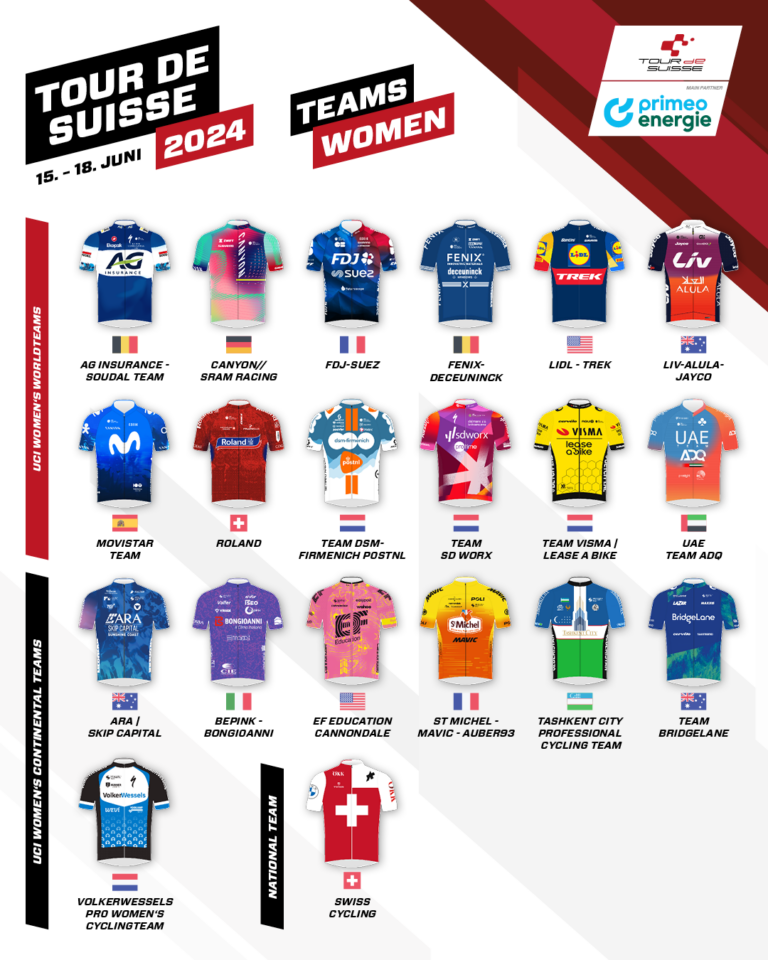
National Team rounds out the women’s peloton
As in the men’s Tour de Suisse, Swiss Cycling will field a young National Team in the women’s race. Mathias Frank, responsible for selecting the teams says: “We saw at the Tour de Romandie Féminin how the Swiss National Team can inspire cycling fans in Western Switzerland. It is therefore particularly pleasing to have them back at the start of the Tour de Suisse Women, which is being held entirely in this region.”
“It’s great for us to be able to participate in this fantastic race with a Swiss squad. Of course it is not yet known which athletes will be at the start. One thing is for sure though and that is we won’t just be along for the ride but will try to make our mark and challenge the big teams,” says women’s National Coach Edi Telser.
Also flying the Swiss flag alongside the National Team is Team Roland. For them the final two stages will be more or less home races. This is because the headquarters of the Cornu Group, to which the Roland brand belongs, is located in Champagne on Lake Neuchâtel.
A total of 23 teams will line up at the start of the men’s Tour de Suisse in Vaduz on 9th June 2024. After one year’s absence, the Swiss Cycling National Team will be back along with the 18 UCI WorldTeams plus four additional teams from the UCI ProTeam ranks.
All WorldTeams at the Start
For many decades the Tour de Suisse has been a fixture of the cycling calendar as vital preparation for the Tour de France. “This spot in the calendar makes us very attractive for the big teams and riders,” says Tour Director Olivier Senn. On June 9th, all 18 UCI WorldTeams will once again line up at the start in Vaduz. The starting field also features four promising UCI ProTeams, two of which have received an invitation as prescribed by the regulations. The other two ProTeams are the Swiss teams Tudor Pro Cycling and Q36.5 Pro Cycling, who each received a wildcard entry. The 23rd team to be selected is the Swiss Cycling National Team.
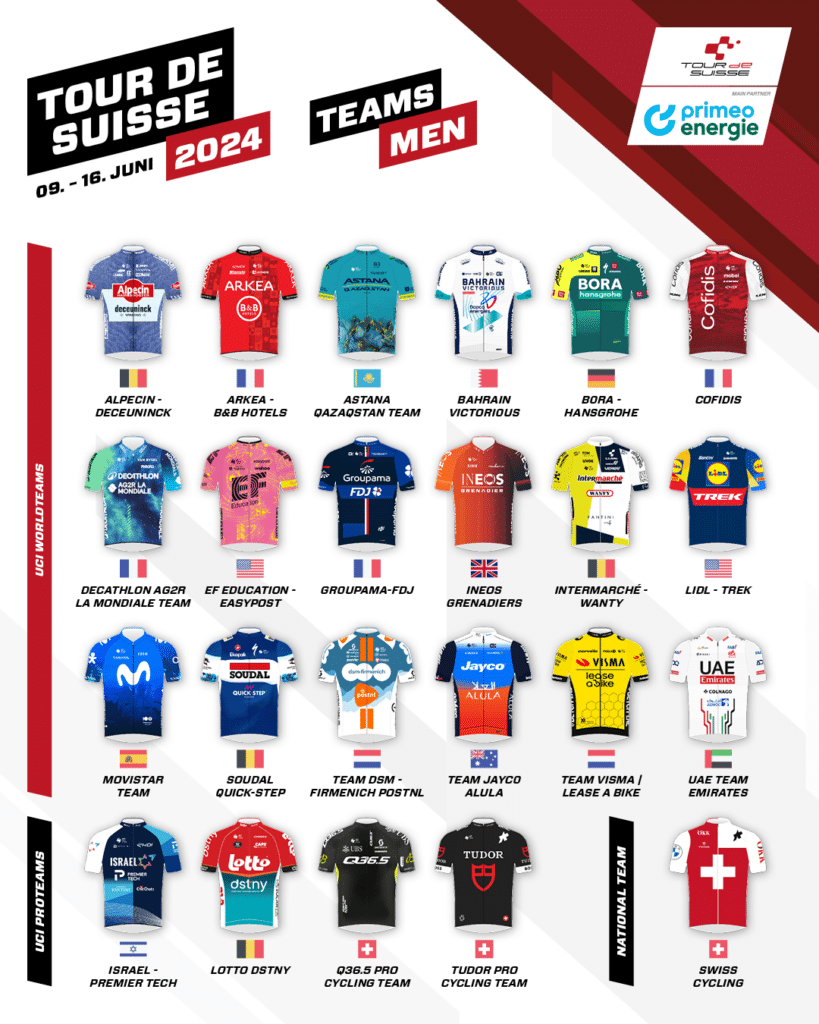
Swiss UCI ProTeams on the ascent
The Tudor Pro Cycling Team made a name for itself on the world stage last year and recently achieved its first UCI Worldtour victory. As a result of these successes, the Swiss team received an invitation not only for its home race, but also for the Giro d’Italia: “For us as a Swiss team, the Tour de Suisse is extremely significant. We want to present ourselves to the Swiss public in the best possible light and help to re-ignite enthusiasm for cycling in Switzerland,” said team principal Fabian Cancellara.
The second wildcard was awarded to the Q36.5 Pro Cycling Team. This second team, featuring the two home grown talents of Fabio Christen and Matteo Badilatti, also enjoyed considerable success last season. This year, Jannik Steimle rode to the top of the podium at the GP Denain in France a few days ago and secured the first win of the season for the Swiss-licensed team.
The National Team returns to the peloton
Swiss Cycling will be at the start with a young and motivated squad: “The participation of the national team in the Tour de Suisse gives the second guard of our up-and-coming athletes the rare opportunity to test themselves against the world’s best and gain attention for themselves. In recent years, many athletes have been able to use the home race at WorldTour level as a springboard into professional cycling,” says Swiss Cycling’s Head of Sports, Patrick Müller, regarding the upcoming participation in the Tour de Suisse.
“It is an absolute highlight for the fans along the route to see the Swiss Cross in the peloton. We can certainly look forward to witnessing a motivated and competitive National Team,” says ex-professional Mathias Frank, responsible for team selection at the Tour de Suisse.
Information will be provided on the women’s race once all teams are confirmed.
Primeo Energie and the Tour de Suisse are an ideal fit – both use enormous amounts of energy, and both are firmly committed to sustainability.
Electricity and heat, watts and volts: Energy is Primeo Energie’s day-to-day business. It is also at the very heart of the Tour de Suisse. After all, when cyclists fully lean into their pedals, they release massive amounts of energy.
Cyclists’ energy output is measured in watts, just like at Primeo Energie, and a top sprinter can reach up to 1,900 watts in a race, but only for a few seconds. The figure for women is slightly lower. When averaged over an entire race, the output of a professional cyclist is between 250 and 300 watts. “It’s a bit like the horsepower in cars,” says David Loosli, the sports director of the Tour de Suisse. “Everyone knows how many watts they can produce when in top form.” While an average trained amateur cyclist can produce 3 to 4 watts per kilogram of body weight per hour, professionals can produce between 5 and 6 watts per kilogram per hour.
The crucial thing for doing so is, of course, having the necessary energy supply in the first place. Race preparations certainly call for a balanced diet, but the race itself requires an all-out calorie binge. David Loosli tells us that “you’re always eating during a race.” No wonder, because the body burns up between 8,000 and 10,000 calories during a major event.
Primeo Energie and the Tour de Suisse also have another important aspect in common – a strong commitment to becoming more sustainable. Primeo Energie is therefore gradually switching the heat it supplies away from fossil fuels and towards renewable sources. This means relying increasingly on biomass, waste heat and environmental heat rather than on oil and gas. In their basic supply, customers get electricity that is solely obtained from renewable sources. And aventron, a subsidiary, is one of the largest producers of green electricity in Switzerland.
The Tour de Suisse is also ramping up its efforts to become more sustainable. “We want to cut our CO2 emissions by half by 2027,” says Mario Klaus, Sustainability Officer for the Tour de Suisse. After that, we will strive for “net zero.” In the medium term, the Tour de Suisse aims to become the world’s cleanest cycling event,
It has thus decided on several measures. On the one hand, it will use electric vehicles in its fleet wherever possible, double up on its recycling, include more vegan and regional items in its catering, and ask athletes and their teams to pay close attention to the effect their actions have on the climate. On the other hand, the organisers will ask fans to avoid driving wherever possible and to get to races by public transport or, even better, to come on their own bikes.
The Host Cities of the 87th Tour de Suisse, as well as the fourth edition of the Tour de Suisse Women, can now be revealed. Added to the list of stage finishes are Regensdorf (ZH) and a mountaintop finish on the Gotthard Pass. Steinmaur (ZH) and Locarno (TI) are the final start locations as well as Vevey (VD) for the Tour de Suisse Women.
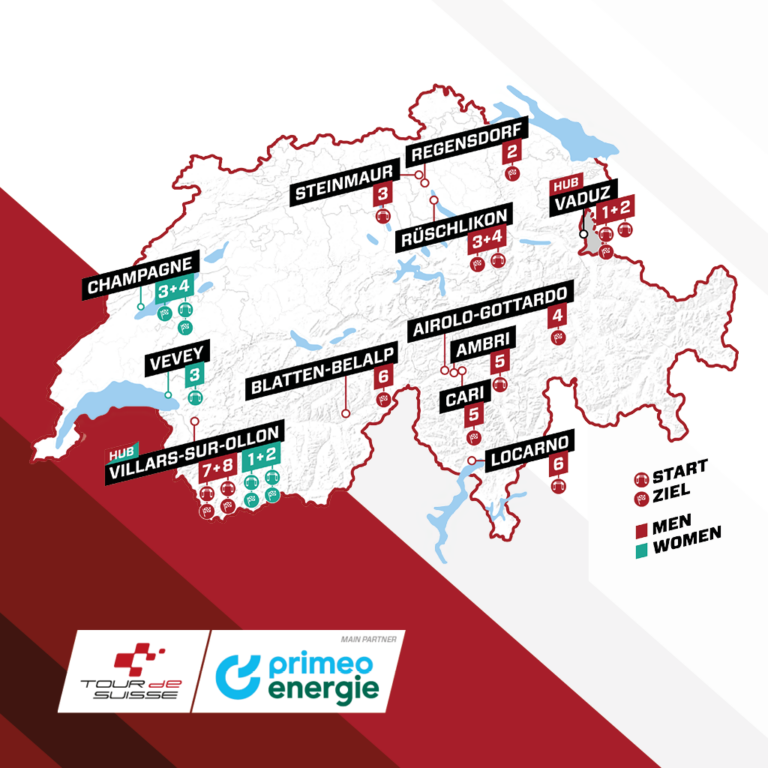
“Without a doubt, the mountain finish of Stage 4 on the Gotthard Pass will be a highlight of this year’s Tour de Suisse,” says Sports Director David Loosli. The last time a stage ended on Switzerland’s most famous Alpine pass was in 2019 with Egan Bernal’s stage win. This time in contrast to five years ago, the Gotthard Pass will be approached from the north via the Schöllenen Gorge and Andermatt.
The most frequented pass in Tour de Suisse history promises to be spectacular as Airolo’s mayor Oscar Wolfisberg is well aware: “Hosting a stage of the Tour of Switzerland is a great honour which transcends sport: in every respect the Gotthard is an unparalleled example of the true nature of Switzerland”.
The municipality of Airolo, situated on one of Europe’s most important transit routes, is the northern gateway to the Italian-speaking region of Switzerland. With numerous energy and soil remediation projects, Airolo is one of the most sustainable municipalities in the country. In 2030, the 22-hectare Parco San Gottardo, directly above the autobahn, will be inaugurated.
Added to the series of Ticino Host Cities – including Ambrì and the mountain village of Carì – is Locarno which hosts the start of Stage 6 on June 14th. Alain Scherrer, Mayor of Locarno, is delighted that the Tour de Suisse is paying a return visit: “It’s great that since 2022, the Tour de Suisse is once again visiting the canton of Ticino for several days. It will spark the emotions and passion in our community”.
Overlooking Lake Maggiore and framed by the Ticino mountains, Locarno features a picturesque and vibrant old town with its palaces, churches and narrow streets. The bustling Piazza Grande hosts various events throughout the year and will also be the starting point for the Tour de Suisse.
Zurich Host Cities in number
After the men’s race kicks off in Vaduz, the stage to Regensdorf, a first-time Host City, then follows on Monday June 10th. “We are extremely pleased to be a stage finish for the Tour de Suisse. It gives us the chance to showcase our municipality from its most hospitable and attractive side, with its rich mix of town and country”, says Mayor Stefan Marty. He added his gratitude to the Regensdorf Cycling Club, which is responsible for the professional organisation of the event.
Regensdorf, an urban centre with village charm, next to the city of Zurich and yet in the midst of nature, is located in the beautiful Furttal valley. A place to work, live, relax and enjoy an active community life!
On the following Tuesday Stage 3 departs a stone’s throw away – in Steinmaur. This cycling-mad village not only organizes one of the most famous cyclo-cross races in Switzerland. No, several pros like Johan Jacobs (Team Movistar), Mauro Schmid (Jayco Alula), Fabian Lienhard (Groupama – FDJ) and the young Noemi Rüegg (EF Education-Cannondale) also come from the talent factory of Veloclub Steinmaur, which will take over the organisation of the first Tour de Suisse visit to the municipality.
Mayor Andreas Schellenberg greatly appreciates this work: “We would like to take this opportunity to thank the Veloclub for its commitment. The Municipal Council is both pleased and proud that Stage 3 will start in our village”.
Tour de Suisse Women exclusively in western Switzerland
After the first two stages of the fourth Tour de Suisse Women in Villars-sur-Ollon, Stage 3 starts on Monday June 17th in Vevey on Lake Geneva. Vevey hosted the men’s race twice (1993 and 2002) and is now excited to welcome the female cycling pros for the first time. Joël Brönnimann, President of the Organising Committee and Vélo Club Vevey, explains that this stage start will be very special: “Hosting the women’s Tour de Suisse for the first time coincides with the 140th anniversary of our Club and therefore is particularly significant.”
The town of Vevey is nestled on the edge of Lavaux and reveals its charm between the lake and the mountains. With an extensive network of cycle paths in the town centre, along Lake Geneva and up to various peaks in the region, it is no surprise that cycling is very popular with locals and tourists alike.
Stage 3 starts in Vevey and heads to Champagne. The small village on Lake Neuchâtel is also the start and finish of the fourth and final Tour de Suisse Women stage on Tuesday June 18th. “After three years in Eastern Switzerland, we are delighted that the women’s races are taking place in the French-speaking region of the country where we are confident the route will be lined with fans,” says Tour Director Olivier Senn.
Route planning is now in its final stages so that the detailed route can be released at the end of March. Click here for an overview of all Host Cities.
The Schwyz town of Küssnacht am Rigi, situated on Lake Lucerne, will host the start weekend of the 88th Tour de Suisse in 2025.
“We are delighted to be able to announce the Start Hub for the 2025 men’s race while we are still finalising the route for the upcoming Tour de Suisse from 9th-18th June 2024,” says Tour Director Olivier Senn. In addition to the first stage on Sunday, the men’s Team Presentation will be held in Küssnacht SZ on Saturday.
For route planner David Loosli it is a great advantage to already know the start location of the 88th Tour de Suisse. “The sooner we know the Host Cities, the sooner we can start with the details of planning the route”. As far as the route in Küssnacht is concerned, Loosli can reveal the following at this early stage: “The Tour will start with a conventional stage centred around the Rigi rather than a Time Trial.”
Küssnacht am Rigi eagerly awaits the Tour de Suisse
The village on Lake Lucerne last hosted a stage of the Tour de Suisse in 1999 and is very much looking forward to the return of the event. Urs Durrer, President of Küssnacht’s Organising Committee, says: “The Tour de Suisse is a sporting event of superlatives. The local OC of Küssnacht is excited to be able to realise the start weekend in 2025. We will do everything we can to create a fantastic event for the whole community and all cycling fans from Friday through to Sunday”.
With its 14,000 residents, the district of Küssnacht is an attractive place to live and work and provides an ideal starting point for many tourist activities. The Tour de Suisse is an excellent opportunity for Küssnacht to present itself nationally and internationally.
The remaining host cities for 2024 will be revealed in the coming weeks. Complete route details will be announced at the end of March.
Next year the Tour de Suisse will visit Rüschlikon (ZH), Ambrì and Carì (both TI) as well as Blatten (VS).
Alongside the previously announced Hubs – in 2024 Vaduz hosts the opening weekend and Villars-sur-Ollon the final weekend – the first Host Cities for the men’s Tour de Suisse are revealed. David Loosli, responsible for planning the route, says: “We are delighted that we will be present in three Swiss linguistic regions. These Host Cities promise an exciting route with a variety of topographical challenges for the cyclists.”
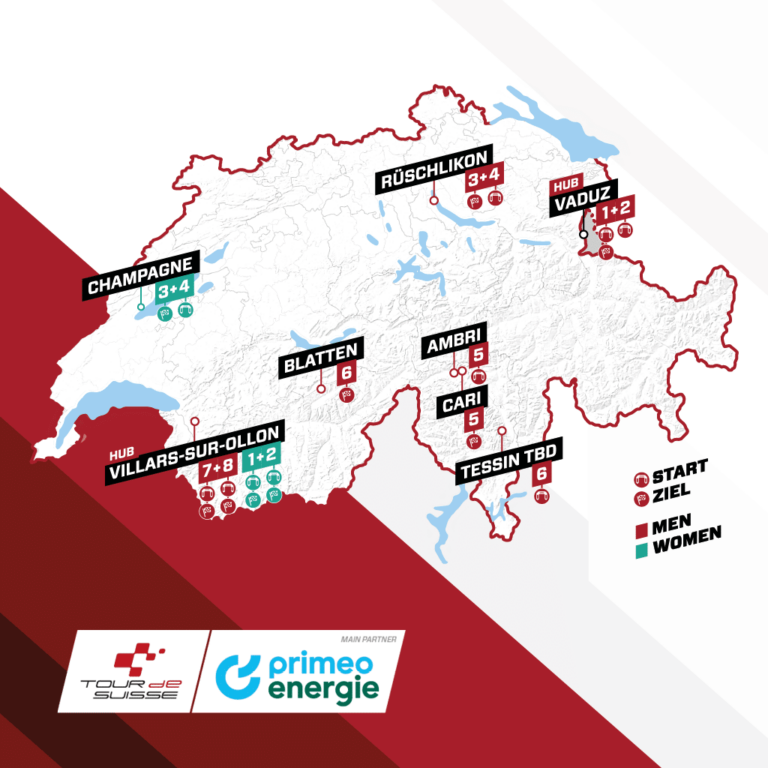
Rüschlikon on Lake Zurich makes its debut
On Tuesday 11th June 2024, the finish line of Stage 3 will be in Rüschlikon. It is the first time the town on the left bank of Lake Zurich hosts a stage of the Tour de Suisse. As well as the finish, the start of the fourth stage will also take place in Rüschlikon on Wednesday.
OC President, Donat Grimm, is confident that the Tour de Suisse will be perfectly at home in Rüschlikon : “I think that the beautiful municipality of Rüschlikon on Lake Zurich, is a charming and modern Host City perfectly suited to Switzerland’s top cycling event. We are close to the heart of Zurich and yet the atmosphere here is pleasantly rural and welcoming.”
Three Host Cities in Ticino
Ticino features three times next year. On 13th June 2024, Stage 5 heads from Ambrì along a challenging route to Carì. From the start in front of the HC Ambrì-Piotta ice rink the stage culminates in Carì with a mountain top finish.
“Since it last visited in 2016, we are ready to give the Tour de Suisse a warm welcome next year. The final climb to the holiday resort of Carì with its 22 hairpin bends is reminiscent of the legendary Alp d’Huez and promises to be spectacular,” says OC President Gabriele Gendotti
In addition to numerous historical and cultural sights, the Leventina District offers a wide range of outdoor leisure activities. In summer there are wonderful hikes, climbing treks and cycle routes. Carì scores highly as a winter sports resort with its ski slopes, winter hiking trails and various activities on the ice.
The starting gun for Stage 6 will be fired the next day also in Ticino. The exact location will be announced in the coming weeks.
Blatten returns as a Host City for the first time since 1974
When Blatten near Naters last hosted a stage of the Tour de Suisse, the start list included illustrious names such as Louis Pfenninger and the great Eddy Merckx. The Belgian went on to win the GC that year. Fifty years later and a mountain top finish is once again on the programme in Blatten. The winter sports resort hosts the finish of Stage 6 on Friday 14th June 2024.
Mario Gertschen, CEO of Blatten-Belalp Tourism, is clearly looking forward to the event: “We are very excited to be able to organise a stage arrival in Blatten-Belalp again 50 years after the last event. We will do everything possible to ensure that the mountain finish is an unforgettable experience for all participants and spectators.”
Blatten, the picturesque mountain village belonging to the municipality of Naters, is one of the most popular holiday destinations in Switzerland in both summer and winter. The Tour de Suisse is a great opportunity to showcase the unique natural beauty of the area around the Great Aletsch Glacier to a national and international audience. The finish in Blatten will be a major celebration for locals and visitors alike.
The remaining host cities for 2024 will be revealed in the coming weeks. Complete route details will be announced in March.
At the Swiss Time Trial Championships in Gansingen, Elena Hartmann and Stefan Bissegger won the national titles in the elite category.
At the Swiss Time Trial Championships in Gansingen, Aargau, the new Swiss champions were crowned in the best conditions. Due to the late date of the championships, the starting field was somewhat smaller than usual. While the current European champion and four-time Swiss time trial champion Marlen Reusser has already ended her season in the women’s race, Stefan Küng was also absent due to injuries he sustained at the European time trial championships.
Stefan Bissegger, on the other hand, was back at the start after a two-year absence in the fight for the coveted champion’s jersey and the Thurgau native left no stone unturned. With a lead of more than one minute, the 25-year-old secured his first Swiss champion’s jersey in the elite category and relegated Yannis Voisard and Noah Bögli to the other ranks. The joy about the title was great for the silver medalist of the European Time Trial Championships in Drenthe. “I’m very happy about the jersey and glad that it went well. I didn’t have the best season, so it’s nice to be able to show what I’ve got at the end of the season.”
In the elite women’s race, Elena Hartmann was able to defend her title from last year. She won with more than two minutes ahead of Nicole Suter and Michelle Stark. The 32-year-old was very satisfied after what she describes as a difficult season: “It means a lot to me to ride another year in this beautiful champion’s jersey. In the past time trials this season it didn’t go at all, so I started from scratch again in preparation for these championships. It paid off, everything worked out today and it was really fun.
Photo-Credits: Sam Buchli
In the elite national category, defending champion Noah Bögli secured his second champion’s jersey ahead of Simon Vitzthum and Leonard Hofer. Fabian Weiss also defended his U23 title ahead of his Tudor teammate Tim Rey and Luca Jenni. Noemi Rüegg also prevailed again and won her last race in the U23 category, Linda Zanetti had to make do with second place like last year. Third place went to Léa Stern.
In the junior women’s event, Kyra Reichmuth celebrated her first championship title, beating Lara Liehner and Livia Steinmann. In the juniors Nicolas Bialon was happy about his first gold medal. Luca Bühlmann and Simon Wirz completed the podium.
In the paracycling event, Benjamin Früh and Sandra Stöckli succeeded on the handbikes; Céline van Till and Timothy Zemp let themselves be celebrated as the winner and winner, respectively, in the standing.
In today’s segment on teams’ sustainability actions, we turn our attention to Movistar. Movistar is the team with one of the largest pedigrees when it comes to environmental action. Movistar was even featured in a document released by the International Cycling Union (UCI) in 2020 as an example of sound team engagement.
Team Movistar has been measuring their footprint for a number of years and is using that the results to guide its actions. With the benefit of having been involved for a while, they have been able to run assessment exercises several times to reflect on the impact of their actions. Each assessment is a snapshot in time. It is important to repeat the exercise on a regular basis to ensure progress. Movistar is a leading example in its field in that respect.
As far as reductions, the team blends solutions meant to directly reduce their footprint, such as using travel policies, solar panels and other means to manage energy consumption, with solutions meant to offset their residual impact, such as engaging in tree planting programs.
All in, their efforts combine to represent a fairly holistic approach to the problem, while remaining direct and practical.
In today’s instalment of our segment on teams’ sustainability actions, we turn our attention to Team Lidl-Trek. At a strategic level, the team works closely with its sponsor, Trek, which is very active on sustainability issues. You can find out more on their website.
However, on a day-to-day basis, the team favors small actions that when put together and repeated over and over, result in a measurable impact. For instance, the organization uses energy produced in more sustainable ways at their office and logistics center. Various waste management solutions are used consistently. For instance, reusable coffee cups are used in buses/trucks to avoid obvious waste. Lunches are also served in reusable containers. The staff is encouraged to drink water from the tap and use reusable water bottles. Vehicles are washed only when needed. The list goes on.
While all those actions seem small when considered individually, over an entire season the impact becomes material. Implementing these strategies with the team and support staff also helps them carry the same concepts in their own lives, which helps create a snowball effect.
